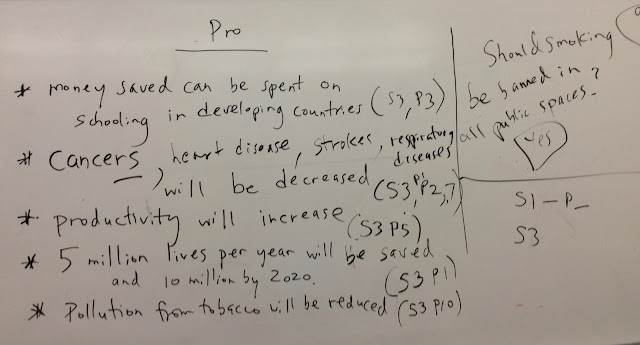
What exactly is listening? How does the process occur? How can we improve our listening?
These are important questions to consider as it is estimated that 40-50% of the time we are engaged in listening of some type or other.
The first point to understand is that we listen with our brain, not our ears. If our brain is turned off or only engaged in a limited way, then our comprehension will be similarly limited. Good listening is active listening.
This relates to the concept of processing (the mental bit) the sounds that enter our ears (the physical bit). We engage in two types of processing:
 1. top down processing -- using our previous knowledge of the topic the words are concerned with; having a purpose for listening; predicting what will be said; here we use a lot of ‘chunking’
2. bottom up processing -- this is very inefficient and we all do it to varying degrees -- we attend to the individual sounds and words;
Comprehension, which can range from 0% to 100%, occurs as a combination of the two processes.
So why on a listening test do you maybe only score 50%?
(Of course, this may be partly due to poor reading or test-taking skills, but that is besides the point of this page.)
The biggest barriers to listening comprehension are:
1. poor vocabulary -- if we don’t know the important (and common) words, then we are stuck.
2. poor pronunciation -- if we don’t know how words are supposed to sound, then we can’t recognize them. Spoken correctly, they may not be as we say them and hence believe they should sound like.
1. top down processing -- using our previous knowledge of the topic the words are concerned with; having a purpose for listening; predicting what will be said; here we use a lot of ‘chunking’
2. bottom up processing -- this is very inefficient and we all do it to varying degrees -- we attend to the individual sounds and words;
Comprehension, which can range from 0% to 100%, occurs as a combination of the two processes.
So why on a listening test do you maybe only score 50%?
(Of course, this may be partly due to poor reading or test-taking skills, but that is besides the point of this page.)
The biggest barriers to listening comprehension are:
1. poor vocabulary -- if we don’t know the important (and common) words, then we are stuck.
2. poor pronunciation -- if we don’t know how words are supposed to sound, then we can’t recognize them. Spoken correctly, they may not be as we say them and hence believe they should sound like.
3. poor accommodation strategies:
- words are spoken in connected strings -- they are often slurred and said quickly whereby they blend together ( ex. for getting vs. forgetting; watchagonnado?)
- we often don’t catch bits of what we hear, but we can guess or infer what we miss based on context -- like filling in a puzzle
4. unfamiliarity with different speaking formats
5. weak knowledge of the world and its many different domains
If you want to improve your listening, then you must attend to the weaknesses just discussed.
As you listen, you should be interpreting what you hear. People create understanding of oral input in different ways because people are all different. As you listen, you should be making a story and hence meaning out of the various strings of sounds/words.
Here are the top ten macro strategies to improve your listening ability.
1. Listen to stories -- this develops the top down processing skills.
2. Practice cloze and dictation activities -- this develops the bottom up skills
3. Do extensive listening -- on many different topics; from many different voices; from varied
formats (ex. news; interviews; lectures; songs)
4. Immersion -- surround yourself with English -- minimize L1 oral input; minimize translation
5. Improve your vocabulary -- first the top 3000 words; then the top 5000 words; then the top 8000
words
6. Study the English sounds -- productive and receptive phonetics
7. Interact in English -- have a friend with whom you must speak English; speak to homestay
family frequently
8. Listen and make a summary -- then check with someone else
9. Practice listening activities with a partner
10. Use the many different listening resources on the Internet
Here is a list of many micro strategies: (from Listening and good language learners; Goodith White in Lessons from Good Language Learners, ed. Carol Griffiths. Cambridge:Cambridge University Press. 2008)
1. Cognitive strategies: mental activities learners use to remember and develop language and enhance comprehension
- predicting what a piece of listening will be about, or what language/information will come next;
- drawing inferences when information is not stated or has been missed;
- guessing meaning of unknown words
- using intonation an pausing to segment words and phrases;
- other micro-strategies to do with processing language -- identifying stressed words, listening for markers, listening for structures, etc.;
- using schematic and contextual information (top down) together with linguistic information (bottom up) to arrive at meaning;
- visualizing the situation they are hearing about; piecing together meaning from words that have been heard.
2. Metacognitive strategies: these are activities learners use to organize, monitor and evaluate how well they are understanding.
- focusing attention, concentrating and clearing the mind before listening;
- applying an advance organizer before listening (I think the topic is going to be … so …);
- going in with a plan (I’m going to listen for … words I know/key words);
- getting used to speed and finding ways of coping with it;
- being aware when they are losing attention and refocusing concentration;
- deciding what the main purpose of listening is;
- checking how well they have understood;
- taking notes;
- paying attention to the main points;
- identifying listening problems and planning how to improve them.
3. Socio-affective strategies: activities in which learners interact with other people in order to help their comprehension and encourage themselves to continue listening.
- asking for clarification;
- checking that they have got the right idea;
- providing themselves with opportunities for listening;
- motivating themselves to listen;
- lowering anxiety about listening;
- providing a personal response to the information or ideas presented in the piece of listening;
- empathizing with the speaker and trying to understand the reason for a particular message.
Your listening ability will not improve overnight, but an organized and effective strategy implemented over many months can indeed have dramatic results.
















